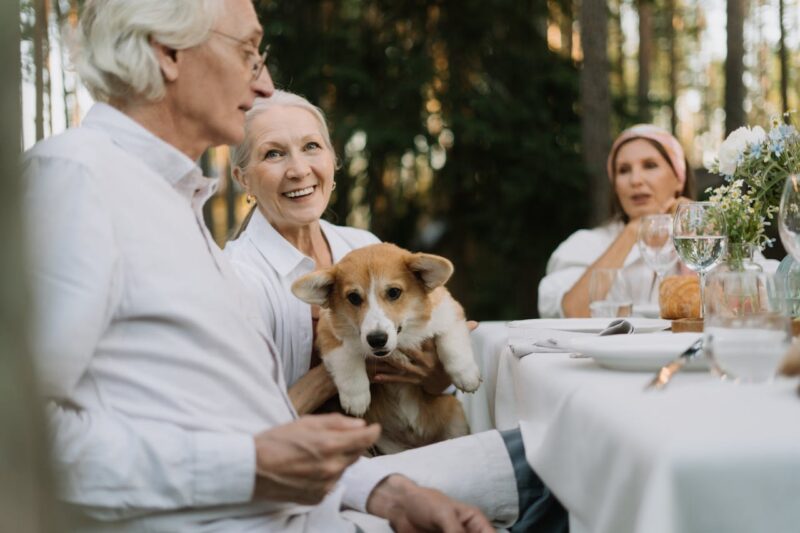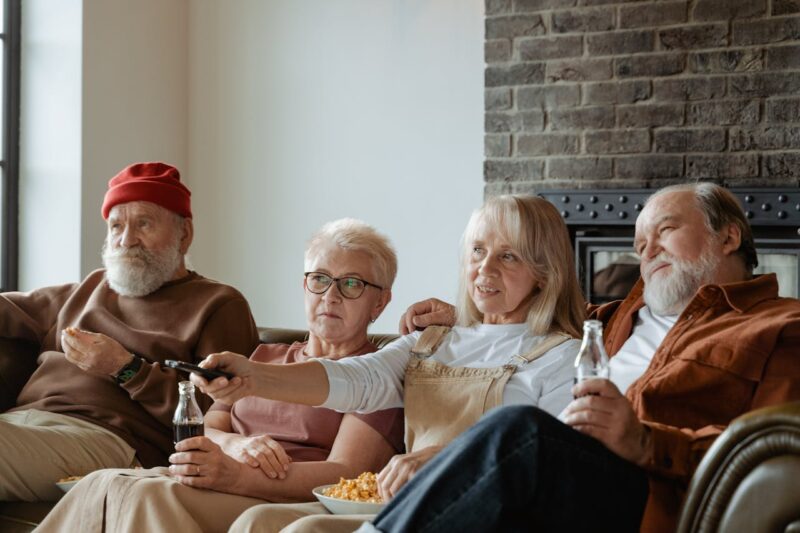
Surprisingly, owning a furry companion can enhance the well-being of seniors. From boosting mental health to encouraging physical activity, the right canine companion can bring immeasurable joy. Choosing a dog that suits a senior’s lifestyle and needs is crucial for fostering a harmonious bond.
Research indicates that certain breeds excel in providing companionship and support for older adults. In this guide, we explore the best dogs for seniors, considering factors like size, temperament, and exercise requirements. Discover how these loyal four-legged friends can offer not just friendship but also a sense of purpose and security to seniors seeking a fulfilling companionship in their golden years.
Why Seniors Need Dogs
Companionship Benefits
Many seniors find great solace in the companionship provided by their furry friends. Seniors often experience feelings of loneliness, which can be alleviated by having a dog around. The presence of a loyal canine companion can bring immense joy and comfort to seniors.
Dogs are known for their unconditional love and loyalty, providing seniors with constant companionship. The bond between a senior and their dog can be incredibly strong, offering emotional support during both good and challenging times.
Improved Mental and Physical Health
Owning a dog can have profound effects on the mental and physical well-being of seniors. Daily walks with their furry friends encourage senior owners to stay physically active, promoting better cardiovascular health. The routine of caring for a dog also helps maintain cognitive functions and reduce the risk of depression in seniors.
The presence of a dog at home can create a sense of purpose for many seniors, giving them something to care for and nurture. This responsibility fosters a feeling of being needed and loved, contributing positively to the overall mental health of seniors. Interacting with dogs has been shown to release oxytocin, which are natural mood enhancers that can help alleviate stress and anxiety in seniors.
Reducing Loneliness
One significant benefit that dogs offer to seniors is reducing feelings of loneliness. Dogs are excellent companions that provide constant company, preventing isolation and boredom in older individuals. The playful antics and affectionate nature of dogs bring joy and laughter into the lives of many seniors, creating meaningful connections.
Having a dog encourages social interactions for seniors, as they often meet other pet owners during walks or visits to the park. These encounters help combat feelings of loneliness by fostering new friendships and community connections among seniors. The presence of a dog not only reduces loneliness but also promotes an active social life for older individuals.
Choosing the Best Dog for Seniors
Energy Levels
When selecting a dog breed for seniors, it’s crucial to consider the energy levels of the pup. Seniors may prefer breeds that are calm and require minimal exercise.
Seniors should opt for dog breeds that match their activity levels. Low-energy dogs like Bulldogs or Basset Hounds can be ideal companions for seniors who prefer a relaxed lifestyle.
Grooming Needs
Another essential factor to consider when choosing a dog for seniors is the grooming needs of the breed. Seniors should look for dogs with low maintenance coats that require minimal grooming.
For seniors who may have mobility issues, selecting a dog with minimal grooming needs can make daily care more manageable. Breeds like Beagles or Dachshunds have short coats that need regular brushing but don’t require extensive grooming sessions.
Temperament and Size
The temperament and size of a dog play significant roles in determining its suitability for seniors. Seniors should prioritize breeds known for their gentle and affectionate personality traits.
Small to medium-sized dogs are often preferred by seniors due to their manageability and ease of handling. Breeds like Pugs or Cavalier King Charles Spaniels are not only compact in size but also known for being friendly and adaptable.
Key Considerations:
Opt for low-energy dogs like Bulldogs or Basset Hounds.
Choose breeds with low maintenance coats such as Beagles or Dachshunds.
Prioritize gentle and affectionate breeds like Pugs or Cavalier King Charles Spaniels.
Small Dog Breeds Overview
Space Efficiency
Small dogs are ideal for seniors living in smaller homes or apartments, requiring less space compared to larger breeds. Their compact size makes them convenient companions for those with limited living areas.
Small breeds like Chihuahuas or Pomeranians are perfect for seniors who prefer short walks or have mobility limitations. These dogs provide the joy of pet ownership without the physical strain of handling a larger animal.
Best Small Dogs for Seniors
Maltese
Maltese are a popular choice for seniors due to their gentle temperament and hypoallergenic coat, they are perfect for seniors seeking affectionate and low-shedding pets.
Chihuahua
Chihuahuas are tiny dogs, weighing around 2-6 pounds. They are known for their loyalty and make great companions for seniors due to their low exercise needs.
Pomeranian
The Pomeranian is another small breed suitable for seniors. Despite their fluffy appearance, these dogs only weigh a few pounds and have a thick double coat that requires regular grooming.
Dachshund
Dachshunds, with their unique elongated bodies, are great choices for seniors living in apartments. Their short coats require minimal grooming, making them easy to handle.
Shih Tzu
Shih Tzus are loved by seniors for their friendly demeanor, making them excellent lap dogs that provide constant companionship.
Medium Dog Breeds Overview
Energetic Breeds
Medium-sized dogs like Beagles and Cocker Spaniels are ideal for seniors as they offer a good balance of energy and calmness. These breeds typically stand at an average height of around 15-18 inches at the shoulder, making them suitable for indoor living in a senior’s home.
Seniors can enjoy the companionship of these energetic breeds, which require regular exercise but are not overly demanding. Breeds like the Bulldog and the French Bulldog also fall into this category, providing seniors with a playful yet manageable pet.
Temperament and Trainability
For seniors looking for a dog that is both affectionate and easy to train, medium breeds such as the Poodle, known for their intelligence and hypoallergenic coat, are excellent choices. These dogs are not only adaptable to apartment living but also tend to live longer, often reaching 12-15 years of age.
The Shetland Sheepdog, another medium-sized breed, is highly trainable and excels in obedience training. Its gentle nature makes it a great companion for seniors seeking a loyal and well-behaved pet. The Basset Hound, with its mild temperament and moderate exercise needs, offers seniors a laid-back yet loving canine companion.
Large Dog Breeds for Seniors
Challenges and Considerations
Owning a large dog in their golden years can pose challenges for seniors due to the size and energy levels of these breeds. Seniors may find it difficult to handle larger dogs, especially if they have mobility issues.
Specific Large Breeds
Despite the challenges, some large breeds can still be suitable for seniors based on their characteristics. The Golden Retriever is a popular choice as they are gentle, loyal, and easy to train. Another option is the Labrador Retriever, known for their friendly nature and adaptability.
Managing Size and Energy Levels
It is crucial for seniors to manage the size and energy levels of large dog breeds according to their capabilities. Regular exercise is essential to ensure the dog remains healthy and well-behaved. Seniors should also consider the space available in their homes to accommodate larger dogs comfortably.
Therapy Dogs
Training and Certification
Therapy dogs play a crucial role in providing emotional support and companionship to seniors. These specially trained dogs are not the same as service dogs, as they focus on providing comfort and affection rather than performing specific tasks. Training therapy dogs involves teaching them to be calm, gentle, and responsive to human emotions. They must also learn how to interact with strangers in various environments.
The certification process for therapy dogs ensures that they are well-behaved and suitable for interacting with seniors. Dogs undergo evaluations to assess their temperament, behavior, and obedience. Once certified, these furry companions can visit hospitals, nursing homes, and assisted living facilities to bring joy and comfort to older adults.
Positive Impact on Seniors
Therapy dogs have a profound positive impact on seniors’ mental well-being and quality of life. Interacting with these furry friends can reduce feelings of loneliness, anxiety, and depression among older individuals. The presence of therapy dogs has been shown to lower blood pressure, decrease stress levels, and increase overall happiness.
Emotional Support: Therapy dogs offer unconditional love and companionship, creating a sense of connection for seniors who may feel isolated or lonely.
Physical Benefits: Taking short walks with therapy dogs can encourage seniors to stay active and engaged, promoting better physical health.
Mental Stimulation: Engaging with these animals can stimulate cognitive functions and memory recall in older adults.
Social Interaction: Therapy dog visits provide opportunities for seniors to socialize with others and share stories about their own pets.
Dog Breeds to Avoid
Size Considerations
Large breeds like Great Danes or Saint Bernards may not be ideal for seniors due to their size and strength, posing a challenge for handling and care.
Seniors might find it difficult to control these big dogs during walks, leading to potential falls or injuries. The sheer size of these breeds can also make grooming and feeding them more challenging.
High-Energy Breeds
Energetic breeds such as Border Collies or Dalmatians may not be suitable for seniors who may struggle to keep up with their exercise needs.
Seniors might find it overwhelming to meet the high activity levels of these breeds, which could result in behavioral issues if the dogs don’t get enough physical and mental stimulation.
Grooming Intensive Breeds
Breeds with high grooming requirements like Poodles or Bichon Frises might not be the best choice for seniors due to the regular maintenance needed to keep their coats healthy.
Seniors may find it challenging to brush, trim, and groom these dogs regularly, leading to matting, skin issues, or expensive trips to professional groomers.
Final Remarks
You’ve learned about the best dogs for seniors, understanding why they make great companions and the importance of choosing the right breed. Small, medium, and large breeds each offer unique benefits, with therapy dogs providing additional support.
Now that you’re equipped with this knowledge, take the next step in finding the perfect canine companion for yourself or a senior loved one. Remember to consider factors like size, temperament, and energy level when making your choice. A furry friend can bring immense joy and companionship into your life, so don’t hesitate to welcome a new four-legged family member today!
Frequently Asked Questions
Can dogs benefit the overall well-being of seniors?
Yes, dogs can provide companionship, reduce stress and anxiety, encourage physical activity, and offer a sense of purpose for seniors. The bond between seniors and dogs can lead to improved mental health and increased social interaction.
What factors should seniors consider when choosing a dog?
Seniors should consider the dog’s size, energy level, grooming requirements, temperament, and compatibility with their lifestyle. Choosing a dog that matches their activity level and living situation is crucial for a successful companionship.
Are small dogs suitable for seniors?
Small dog breeds are often ideal for seniors due to their manageable size, lower exercise needs, and suitability for apartment living. Breeds like Chihuahuas, Pugs, or Shih Tzus can be excellent companions for seniors looking for affectionate and low-maintenance pets.
How can therapy dogs benefit seniors’ emotional well-being?
Therapy dogs can provide emotional support, reduce feelings of loneliness and depression, lower blood pressure, and increase overall happiness in seniors. The presence of therapy dogs has been shown to improve mood and create a calming effect in various settings.
Which dog breeds are typically recommended to avoid for seniors?
Breeds known for high energy levels, excessive grooming needs, aggressive tendencies, or large size may not be suitable for seniors. Dogs such as Huskies, Dalmatians, or German Shepherds might require more time and effort than most seniors can comfortably provide.



